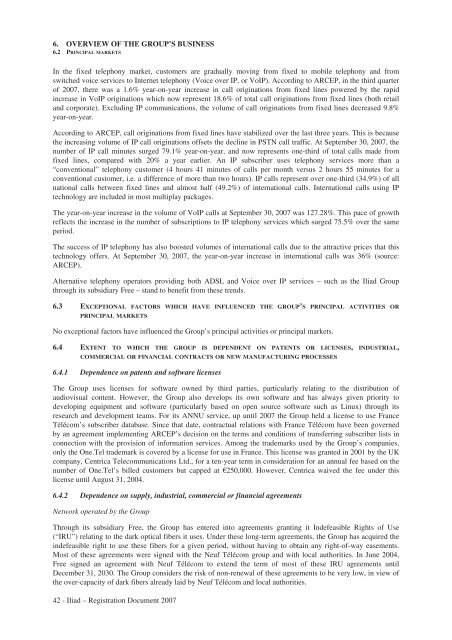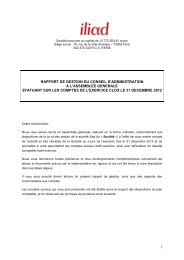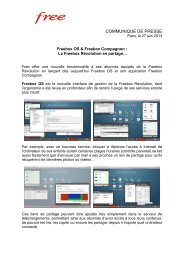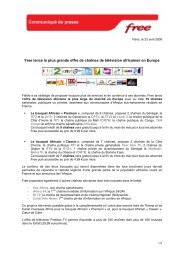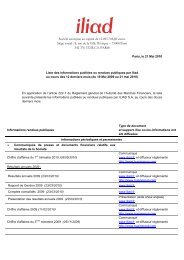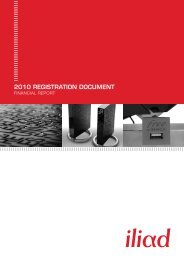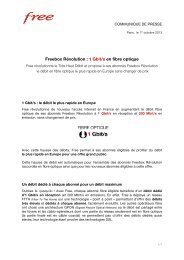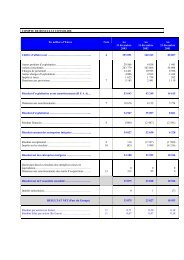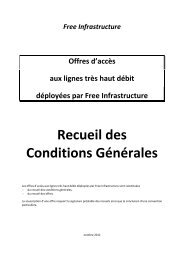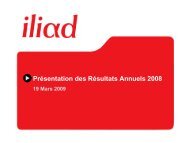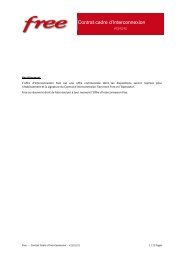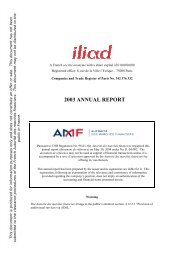REGISTRATION DOCUMENT AND FINANCIAL REPORT - Iliad
REGISTRATION DOCUMENT AND FINANCIAL REPORT - Iliad
REGISTRATION DOCUMENT AND FINANCIAL REPORT - Iliad
- TAGS
- registration
- iliad
- iliad.fr
Create successful ePaper yourself
Turn your PDF publications into a flip-book with our unique Google optimized e-Paper software.
6. OVERVIEW OF THE GROUP’S BUSINESS<br />
6.2 PRINCIPAL MARKETS<br />
In the fixed telephony market, customers are gradually moving from fixed to mobile telephony and from<br />
switched voice services to Internet telephony (Voice over IP, or VoIP). According to ARCEP, in the third quarter<br />
of 2007, there was a 1.6% year-on-year increase in call originations from fixed lines powered by the rapid<br />
increase in VoIP originations which now represent 18.6% of total call originations from fixed lines (both retail<br />
and corporate). Excluding IP communications, the volume of call originations from fixed lines decreased 9.8%<br />
year-on-year.<br />
According to ARCEP, call originations from fixed lines have stabilized over the last three years. This is because<br />
the increasing volume of IP call originations offsets the decline in PSTN call traffic. At September 30, 2007, the<br />
number of IP call minutes surged 79.1% year-on-year, and now represents one-third of total calls made from<br />
fixed lines, compared with 20% a year earlier. An IP subscriber uses telephony services more than a<br />
“conventional” telephony customer (4 hours 41 minutes of calls per month versus 2 hours 55 minutes for a<br />
conventional customer, i.e. a difference of more than two hours). IP calls represent over one-third (34.9%) of all<br />
national calls between fixed lines and almost half (49.2%) of international calls. International calls using IP<br />
technology are included in most multiplay packages.<br />
The year-on-year increase in the volume of VoIP calls at September 30, 2007 was 127.28%. This pace of growth<br />
reflects the increase in the number of subscriptions to IP telephony services which surged 75.5% over the same<br />
period.<br />
The success of IP telephony has also boosted volumes of international calls due to the attractive prices that this<br />
technology offers. At September 30, 2007, the year-on-year increase in international calls was 36% (source:<br />
ARCEP).<br />
Alternative telephony operators providing both ADSL and Voice over IP services – such as the <strong>Iliad</strong> Group<br />
through its subsidiary Free – stand to benefit from these trends.<br />
6.3 EXCEPTIONAL FACTORS WHICH HAVE INFLUENCED THE GROUP’S PRINCIPAL ACTIVITIES OR<br />
PRINCIPAL MARKETS<br />
No exceptional factors have influenced the Group’s principal activities or principal markets.<br />
6.4 EXTENT TO WHICH THE GROUP IS DEPENDENT ON PATENTS OR LICENSES, INDUSTRIAL,<br />
COMMERCIAL OR <strong>FINANCIAL</strong> CONTRACTS OR NEW MANUFACTURING PROCESSES<br />
6.4.1 Dependence on patents and software licenses<br />
The Group uses licenses for software owned by third parties, particularly relating to the distribution of<br />
audiovisual content. However, the Group also develops its own software and has always given priority to<br />
developing equipment and software (particularly based on open source software such as Linux) through its<br />
research and development teams. For its ANNU service, up until 2007 the Group held a license to use France<br />
Télécom’s subscriber database. Since that date, contractual relations with France Télécom have been governed<br />
by an agreement implementing ARCEP’s decision on the terms and conditions of transferring subscriber lists in<br />
connection with the provision of information services. Among the trademarks used by the Group’s companies,<br />
only the One.Tel trademark is covered by a license for use in France. This license was granted in 2001 by the UK<br />
company, Centrica Telecommunications Ltd., for a ten-year term in consideration for an annual fee based on the<br />
number of One.Tel’s billed customers but capped at €250,000. However, Centrica waived the fee under this<br />
license until August 31, 2004.<br />
6.4.2 Dependence on supply, industrial, commercial or financial agreements<br />
Network operated by the Group<br />
Through its subsidiary Free, the Group has entered into agreements granting it Indefeasible Rights of Use<br />
(“IRU”) relating to the dark optical fibers it uses. Under these long-term agreements, the Group has acquired the<br />
indefeasible right to use these fibers for a given period, without having to obtain any right-of-way easements.<br />
Most of these agreements were signed with the Neuf Télécom group and with local authorities. In June 2004,<br />
Free signed an agreement with Neuf Télécom to extend the term of most of these IRU agreements until<br />
December 31, 2030. The Group considers the risk of non-renewal of these agreements to be very low, in view of<br />
the over-capacity of dark fibers already laid by Neuf Télécom and local authorities.<br />
42 - <strong>Iliad</strong> – Registration Document 2007


